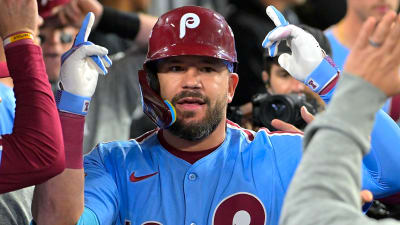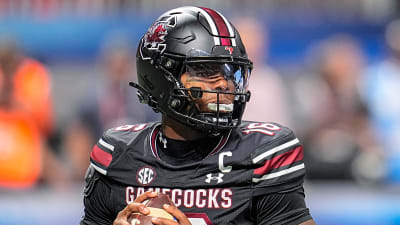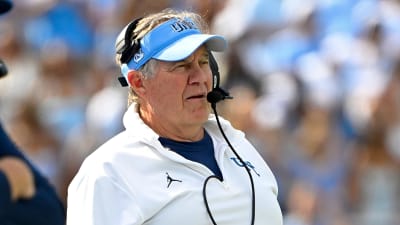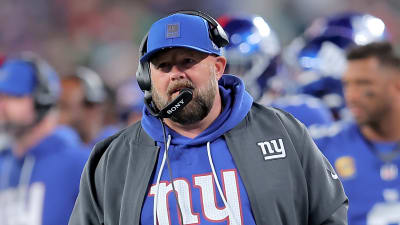
Before the season came to a close, Athletics on SI talked with some of the guys in Green and Gold about the seasons they had and some of the adjustments they had to make in the team's first year in Sacramento.
Jeffrey Springs was one of the first players we talked with, since he had his final start of the season early on, and he was also one of the more insightful perspectives. This is the full interview that we held with Springs a couple of days after his final start.
Athletics on SI: How do you feel after your final start?
Springs: "Still kind of processing, you know. Obviously, everything that happened throughout the year, but overall I was healthy. Made 30 starts, played in 32 games, and you know, to stack the innings being the first year after an injury, I feel like there's a lot of positives.
"Still a lot of room to improve. There's definitely things that I want to fix and continue to work on. I feel like, you know, the last few outings have kind of trended in that direction. So that's a positive. I wish we were playing another month, but it is what it is.
"The big one, just staying healthy and be able to take the ball every five days. Like I said, the innings, the games, those are things to be proud of. Obviously diving into like stuff, results, you know, the things that kind of went on, I have a pretty good idea of what I need to fix. Now I'm excited to kind of get to work this off season to address it."
A's on SI: What do you think you need to fix?
Springs: "Some mechanical things, trying to repeat my delivery, the execution. Way too many walks this year for, you know, couple different reasons. You know, mechanics, just several things, but being able to identify those and realizing what it is, you know what I mean, it's like, alright, now I kind of have things and focus a little bit better. Early on in the year, it was kind of grasping at everything. It didn't work.
"I feel like in the second half I was pitching, like, I want to attack hitters and stuff like that kind of dictating the tempo. Like 'here's my stuff, hit it.' The profiles and the changeup, I need to fix that. It's a pitch that's been hit or miss all year because the delivery is off.
"Coming back from surgery, that's always a pitch I've been able to throw. So maybe it needs to be tinkered a little bit to find the consistency that I'm used to having with it."
A's on SI: Does that have a big impact when you're recovering from surgery and you have to find the right grip and feel for it?
Springs: "I think, yeah. I mean, your cues and your feel , like you're so in tune with everything because of how much we throw. Then when they cut you open and you missed, you know, 15 months, those feelings might not be there.
"Whether it's it just it literally doesn't feel the same coming out of the finger, or your arm doesn't move completely the same way, down to like a millimeter. I'm someone that's a feel pitcher—like I have to be able to feel it to be able to beat it or fix it.
"The changeup was one where I could slow it down, I could make it go left, I could add pressure, I could take pressure off to really manipulate the ball. That's been hard to get back to that point. Maybe it's searching for a feeling that has changed, and I've got to find a new feeling for it.
"There's a few things I want to address, but I'm excited with where I'm at and where I've gotten to. The way I'm moving, the way the ball is coming out, there's a lot to be happy about. Now it's getting back to pitching like I'm capable of pitching."
A's on SI: How hard is it when you miss time like that to just, I guess keep up with the Joneses and keep making that progress while also not being able to work on your craft? Are you able to do anything mentally, or how do you keep up?
Springs: "It's tough. I mean, I think it's mental, physical, kind of all of the above. People don't understand you don't feel good for a long time coming back. They see you out there pitching and it's like, Oh, why is he not doing this, this or this?
"There's a lot that people don't realize how you feel, the body, you know, you're reacting to stresses again, and when you're trying to throw as hard as we are, and then you're laid off for so long, it takes awhile to get that back. Unfortunately, the only way to get better is to be out there, trying to make adjustments on the fly.
"Find the feeling. Find your rhythm, your mechanics. All the very small things that go into what we do that gives us the ability to succeed. It's hard. This year I got tested a lot with that. I expected it to be like it was before, because that's all I remember, and definitely [needed] a lot of patience, which I don't do very well with.
"So it's tough. It really is. Everybody goes at it at a different speed, but you kinda just gotta grind through it and just keep trusting what you do, the process. It just takes time."
A's on SI: What goes into that grind of finding that next level?
Springs: "For me, it's understanding. I understand who I am, what I do, why my pitches move the way they do, where, you know, my ranges want to be from stride direction, stride length, the force in the ground, the arm angle, the pitch profiles.
"There's a lot of things that you know, you kind of learn over the years, it's like 'if I can stay in these ranges and move this way, everything's trending in the right direction. Now it's just pitch and execute. Early on, the shapes weren't there, the spin efficiency—things that make my fastball my fastball weren't there.
"When that's not there and the changeups not there, they pair off each other, and it makes it it makes it hard. I feel like I was fishing with one hand behind my back for a while. It's just when you're out there, you're feeding because you're trying to work on it in between the four days, five days at times, but it's tough.
"All the data, when you have access to it, it makes it easier."
A's on SI: Do you inundate yourself with that stuff?
Springs: "I think the big thing is, as a pitcher, especially, you know, like, I say young guys, you gotta know, who you are and what you are. I'm not searching to throw a certain pitch. I'm not gonna throw 98-100 like {Spencer} Strider is. I want my fastball to be in a certain range, so I'm not going to chase, like, Sevvy's [Luis Severino] breaking ball. I have my profiles that I've had success with.
"I know if I'm executing, throwing like I should, and sequencing and all of that, I have success. I've had success. Some people like the information. Other people don't want to know it. Last four years, that's kind of turned into, like normal conversations coming from Tampa.
"It's bullpen sessions, to throwing sessions every game, you know, every day, playing catch, tracking how the ball is flying, how's my partner catching the ball, like little things like that to just try to get feedback, like real-time feedback and make adjustments from there.
"It takes time, because, again, the big league hitters that didn't miss a beat here, they're ready to go. You play catch up, unfortunately. There's some stories where guys, it's like, 'oh, he never missed time.' That's amazing to me, as they're going through it, they're able to do that.
"It's a grind, you know, the body getting acclimated and getting all the stresses of the season, everything kind of takes a toll."
A's on SI: Last one I got for you. Coming over from Tampa in the offseason, there's a brand new situation here in Sacramento. There were a lot of adjustments going on for your season. Is there something that you picked up from this season that hopefully you won't have to deal with next year that could help lead to those results you're after?
Springs: "I feel like the biggest one for me, and in talking to Sevvy and some of the guys that have played for a little while, trying to create that feeling of when you run onto a big-league field. The adrenaline, whatever you want to call it, that you kind of—not play up for the moment—but, it's real.
"You're in a Major League stadium, you're facing Major League hitters. Like, it's go time for the first pitch. Early on, I felt like it was, hadn't been in Triple-A fin ew years other than, like, rehabbing. So last year when I was rehabbing, it was like, 'how do I feel? How's my stuff? More so than results."
"Kind of need to trick the brain a little bit from Opening Day. That was hard to do for the first month or so. Like I said, it's adrenaline, or whatever it is you want to call it, but like when you take the mound, a big-league mound, there's a certain feeling that you have. You look up, you see the decks, you see the fans. That's a hard feeling to replicate.
"I know things were said. Circumstances are what they are. But yeah, you kind of go from Spring Training, and it almost kind of felt a little bit like a continuation so to speak. It's not. It counts. It's real, and I got punched in the mouth with it.
"I had to try to figure out something different, and you pair that with bad stuff, and it was a recipe for disaster.
"But I think coming into next year, everybody has a better grasp of what to expect. So I'm hoping—I'm not hoping. I know it's going to be a lot better from the get go next year."
More must-reads:
- Yankees shortstop undergoes shoulder surgery
- Five MLB stars that need to step it up in the postseason
- The 'MLB playoff debut strikeouts leaders' quiz
Breaking News
Trending News
Customize Your Newsletter
 +
+
Get the latest news and rumors, customized to your favorite sports and teams. Emailed daily. Always free!








